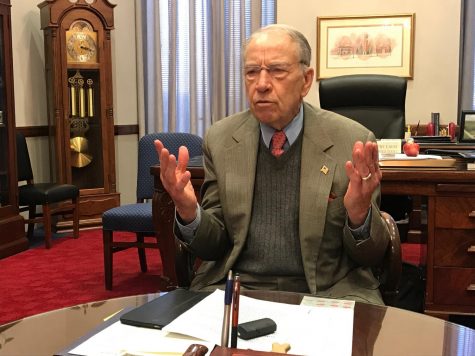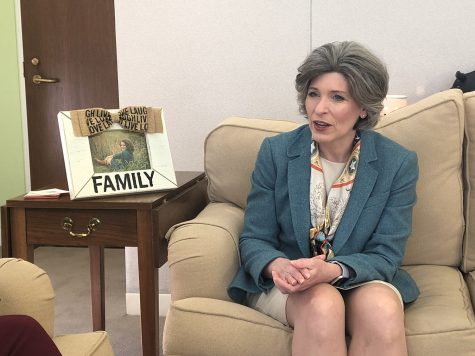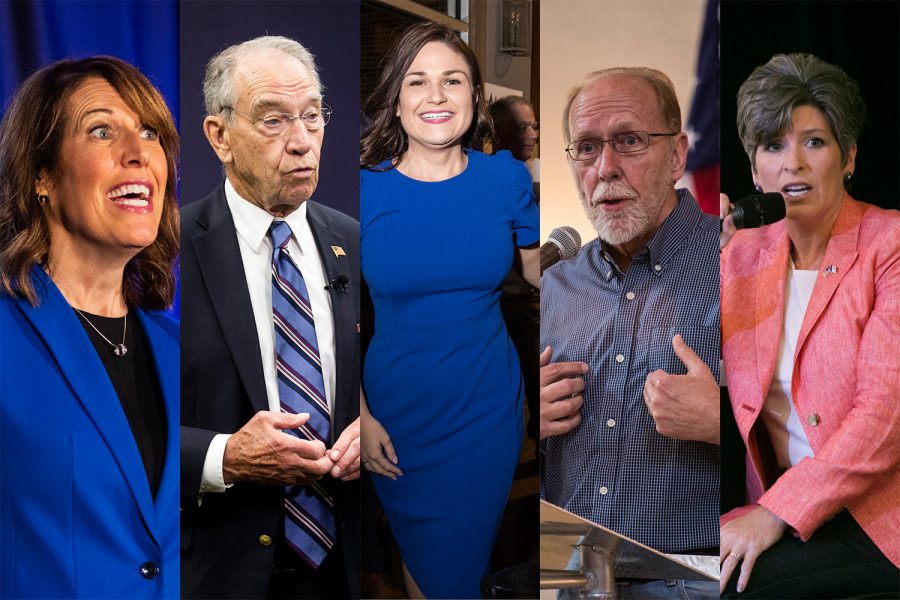Photographs by The Daily Iowan staff.
In Washington, Iowa Democratic and Republican lawmakers find middle ground
Iowa’s congressional delegation is split evenly between Democrats and Republicans beginning this year, and the group has worked together on issues such as rural broadband and insurance.
April 2, 2019
Flooding in southwest Iowa presented an unfortunate but golden opportunity for Iowa’s congressional delegation — now split evenly between three Republicans and three Democrats for the first time in six years — to band together and urge President Trump to make a disaster declaration in more than 50 Iowa counties, which he did March 23.
The senators and representatives for Iowa in the U.S. capital work together on certain advocacy efforts such as with flood relief and legislation such as rural broadband, insurance, and pharmaceutical prices.
One recent example of bipartisan advocacy has emerged as the last two weeks of flooding have put some western Iowa communities, including Hamburg, underwater.
Last week, three members of Iowa’s delegation, Democratic Rep. Cindy Axne and Republican Sens. Ernst and Chuck Grassley, spoke on their respective chamber floors to call attention to flood-relief efforts in Iowa.
Axne, who represents southwestern and part of central Iowa, wrote a letter to the House Appropriations Committee requesting a “robust increase” in funding for programs such as FEMA, USDA, and the Small Business Association to increase grants to help ease land and asset loss.
Ernst promised to review policies of the Army Corps of Engineers applied throughout the floods but did not specify which ones.
Democratic Reps. Abby Finkenauer and Dave Loebsack also offered public support on Twitter.
This is a time when we come together as political parties, as districts across the state & do everything we can to support our neighbors. Thank you @RepCindyAxne, we’ll be sending a letter of support today as well. https://t.co/PuuvtTlrig
— Abby Finkenauer (@RepFinkenauer) March 22, 2019
Iowa Democratic Rep. Abby Finkenauer said in a March 27 interview that Iowa’s balanced delegation is an example on a smaller scale of how the divided Congress, in which Democrats control the House and Republicans maintain a majority of Senate seats, should work across party lines.
“I don’t think people realize how much of the bipartisan conversations actually happen here,” Finkenauer said. “But it’s important that we do because … anything that does get done, we need to get it through both chambers.”
Early in the session, a partnership between Axne and Ernst emerged in the first couple months after the former was sworn in and after two constituents from Dallas County contacted Axne’s office. Two mothers’ children had a rare genetic disorder called ectodermal dysplasias, which inhibits the development of teeth or sweat glands. According to Axne’s office, the family was denied coverage because insurance companies determined corrective surgeries to be “cosmetic.”
Axne became a cosponsor on a bill in February reintroduced into both chambers of Congress that aims to ensure health plans would cover reconstructive surgeries deemed medically necessary. Ernst was an original sponsor on the Senate version of the bill. The proposal hasn’t been brought to a vote by either chamber.
Behind the scenes, the Iowa delegation meets once a month for a breakfast hosted by Ernst. There, delegation members talk about legislative priorities the group shares in addition to asking for advice in addressing challenges in their day-to-day management, Ernst said.
“I think we can set the example for all of our states and show that we can get along and we can work on certain projects together,” she said.
Great Iowa delegation breakfast w/ @RepDavidYoung @RodBlum@ChuckGrassley @daveloebsack @SteveKingIA! pic.twitter.com/00SjpVOknA
— Joni Ernst (@SenJoniErnst) June 4, 2015
The most recent social media post of an Iowa delegation breakfast that could be found was one in 2015
Finkenauer said topics that have dominated the breakfast conversations include broadband and an infrastructure package — which she is working on in her role as a member of the House Transportation and Infrastructure Committee.
Five of the six members of Iowa’s delegation were present for the latest breakfast. The sixth was King, whose spokesman did not respond to emails or phone messages.
“Every member of the delegation is invited to come; although not everyone can make it every time,” Ernst spokesperson Brendan Conley wrote in an email to The Daily Iowan.
Loebsack said he believed lowering pharmaceutical prices was one issue that could draw support from both sides of the aisle, and constituents were increasingly bringing it up in town halls.
Loebsack cosponsors a 2019 bill alongside 20 other representatives that would heighten transparency standards of prescription-drug pricing. The lone Republican House member from Iowa, King, is the only other Iowa cosponsor on the bill.
In the Senate, Grassley held hearings in February to address rising prices of pharmaceuticals such as insulin but said in an interview that he would confer with the House Finance Committee on drafting a piece of legislation to increase transparency among insurers, manufacturers, and consumers.
In 2018, Grassley spearheaded a bipartisan effort to reform the criminal-justice system, including reducing sentences, which President Trump signed into law in December 2018. Then-Judiciary Committee Chairman Grassley was one of 34 Democratic and Republican sponsors of the legislation, which included Ernst.

Sen. Chuck Grassley, R-Iowa, speaks with The Daily Iowan in the Hart Senate Office Building on Tuesday, March 26, 2019.
In perhaps a less bipartisan moment, the Grassley-backed $13.45 billion federal-assistance package, part of which would go to Midwest states affected by flooding, failed to pass the Senate on Monday. Senate Minority Leader Chuck Schumer, D-N.Y., said on Twitter his no vote was cast because not enough resources were included for Puerto Rico in the spending package. In the lower chamber, all but six House Republicans similarly balked at a disaster-aid package that passed in January with all Democrats casting yes votes.
RELATED: Iowa congressional delegation urge additional relief after flooding
University of Northern Iowa political-science Professor Christopher Larimer said although natural disasters have sparked bipartisan legislative efforts, he noted relief legislation introduced after more recent disasters such as Hurricane Harvey — Iowa lawmakers Grassley and Ernst voted against one federal relief package — have grown more contentious.
“Things that should be pretty straightforward are getting sucked into partisan politics,” Larimer said.
Former Des Moines Register political columnist and current host of “Iowa Press” David Yepsen said that although he wasn’t following individual senators and representatives incredibly closely, the coalition coming together on flooding has always been the case, adding that disaster relief often “transcends politics.”
While he couldn’t comment on individuals, Yepsen said, he believes Washington in general is much more partisan than in past decades. Iowa voters like to say they like bipartisanship, he said, but it’s increasingly more difficult for Democrats and Republicans to move from their bases and compromise with the opposite party on legislation. But politicians likely won’t say that, he noted.
“The members aren’t going to tell you, ‘Oh, we fight all the time,’ ” Yepsen said.
Although certain topics attract bipartisan support, according to a collaborative study by several universities, partisanship and noncooperation in Congress has grown exponentially from 1950 to 2012.
In recent years, that trend may be shifting, at least slightly.
An undercurrent of bipartisan activity occurred during the 2017-18 session, according to a separate analysis by the Lugar Center and Georgetown University’s McCourt School of Public Policy. The analysis gives senators and representatives a score based on how many bills he or she cosponsored with a member of the opposite political party.

Sen. Joni Ernst, R-Iowa, speaks in her Washington, D.C. office on Wednesday.
Overall, scores improved for the third-straight Congress after scores bottomed out during the years of 2011-12, Lugar Center President Richard Lugar said in a March 19 press release.
The most recent report ranked Iowa near the top in bipartisanship in 2018, with the state ranked as the 15th most bipartisan one. New statistics on current members (Iowa has two new House representatives this year) won’t come out for at least another year.
Republican Sen. Chuck Grassley ranked eighth of 100 senators for the number of bills he cosponsored with a member of the opposing party during the 2017-18 Congress, according to the Lugar Center analysis. Fellow Republican Ernst came in 19th on the list. On the House side for the same years, the only available rankings for current members were for King, who came in at 425th (there are 435 members of the U.S. House) and Dave Loebsack at 118th.
Is King an outlier?
Finkenauer said in the three months she’d been in Washington, she’d seen King a single time.
“I actually have not seen Congressman King except in an elevator once,” Finkenauer said. “He’s not on any committees now, which, you know, he shouldn’t be given that his views don’t represent Iowa or our country.”
The House Republican Steering Committee blocked King from receiving committee assignments in January after his comments published in the New York Times sparked public outrage and drew rebukes from fellow Republicans.
“White nationalist, white supremacist, Western civilization — how did that language become offensive?” King asked in an interview with the Times.
King has said his comment was mischaracterized.
The move to bar King from committee assignments raised questions about his effectiveness in working with other lawmakers.
House committees enable members of Congress to consider bills and issues as well as oversee agencies, programs, and activities in the committee’s jurisdiction.
King can still vote on the House floor and talk with other House members to influence votes. In a call with reporters in January, Grassley said King would not be as effective without committees but it was up to the voters of the 4th District whether to re-elect him.
Loebsack, who represents southeastern Iowa including Iowa City, which sustained severe flooding in 2008, said he had reached out to King when floods hit northwestern Iowa in 2011.
“At that time, I extended a hand to Steve King and said, ‘Hey we’ve been through this in my district in ’08, we’ll help in any way we can,’ ” Loebsack said.
RELATED: 10 years later, the collective memory of the 2008 flood remains
Now, he is extending help to Axne, whose southwest Iowa district has suffered the brunt of the 2019 floods. He hadn’t talked with King on this particular issue, he said.
When asked if his relationship with King had changed since he was not assigned to any committees, Loebsack said, “No, and I’ll leave it at that.” He stood by previous statements such as one in January when Loebsack called for King to resign, calling his remarks “disgusting and hateful.”
King spokesman John Kennedy said the congressman could not accommodate the DI’s request for an interview while DI staffers were in Washington “due to pre-existing conflicts on his schedule.” The DI met with the five other members of Iowa’s delegation.
